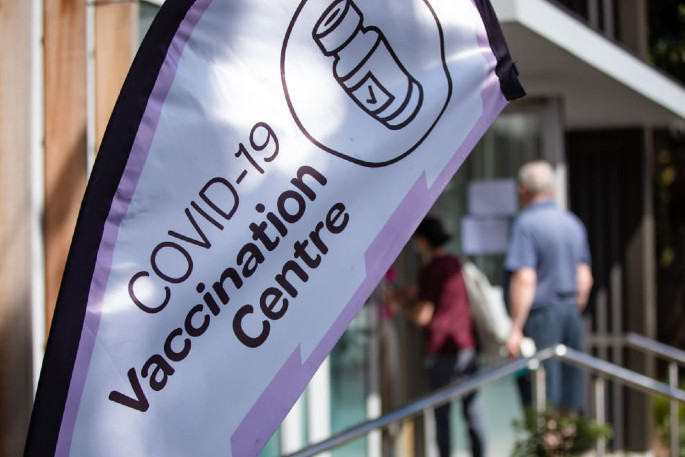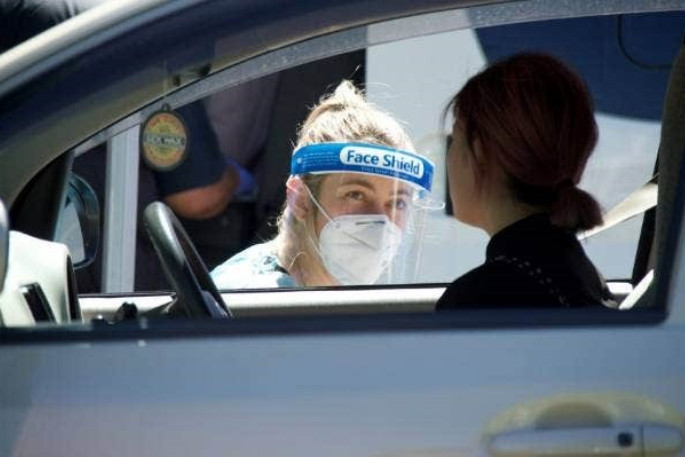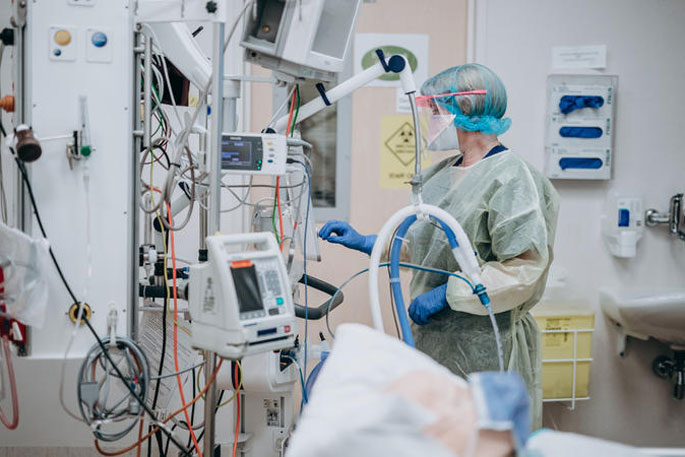A scientific review of the world's research into long Covid carried out by a team of leading UK researchers has led them to declare the burden of the post-infection condition "so large as to be unfathomable".
Immunologist and researcher from London's Imperial College professor Danny Altmann, who led the review team, talked with Saturday Morning's Kim Hill about the findings and the implications of the disease on people's lives and on the larger scale.
The review was published in Nature, and said that if 10 per cent of acute infections lead to persistent symptoms (as earlier studies have concluded could be the case), up to 400 million people could be in need of support for long Covid worldwide.
While the Australian government has allocated $50m for long Covid research, in New Zealand there has been zero investment for bio-medical long Covid research to understand and treat the condition.
Symptoms of long Covid range from the profoundly disabling to 'merely' upsetting. Those with long Covid frequently display a core set of symptoms, Altmann says, including breathlessness, fatigue, wheeze, post-exertional malaise and brain fog.
 Professor Danny Altmann Photo: supplied
Professor Danny Altmann Photo: supplied
But about 200 other symptoms are also associated with the disease, and can come and go, including word-finding difficulties, insomnia, skin rashes and new allergies.
Research has found signs of damage in long Covid patients' hearts, lungs, brains and nervous systems, and signs of disease in their immune systems.
Scientific reviews take a big picture in-depth look at the diverse research and studies that have already been carried out on a topic - in this case long Covid - to give an authoritative collective overviews of findings from the medical and scientific community.
"My job in writing that review was to try and stand back from it and take a really long hard look at the hard data and the hard evidence and the hard numbers and try and put together a kind of consensus that I thought would be useful to build a core agenda moving forward, that would be useful to people," says Altmann.
He is also the coauthor of a book that came out last year called the Long Covid Handbook.
Comparing before and after
Altmann explains how one study drawn on in the review was able to capture 'before' workups of people who later displayed brain and nervous system damage after being affected by long Covid, as the researchers used data already collected on people taking part in a large longitudinal cohort study, the UK Biobank study - some of who had later gone on to develop long Covid.
Extensive MRIs, medical exams and cognitive tests were done on this group over the years, so 'before and after' data could be compared.
"That's where some of the most scary answers come from," Altmann says, "because some parts of their brain had shrunk as a consequence of the Covid, and their scores on cognitive tests had also come down as a consequence of the Covid.
"So I'm sorry to be so scary - but that's how we know."
His team created a 'hypothesis table' of the current theories about how long Covid affects patients' bodies.
Some leading ideas being studied include autoimmune disease (when the body's immune system attacks the body's own proteins), inflammation, blood clotting abnormalities, organ damage, viral persistence (where a reservoir of the virus remains in the body), blood clotting abnormalities, and difficulty with gas exchange and oxygenating the blood.
More than one disease mechanism can be true, Altmann says: "They don't have to be mutually exclusive".
In one theory scientists believe the virus could remain insidiously in many of the tissues in the body, particularly those tissues that have that have the ACE2 receptor which the virus latches on to.
"So it can get into the heart and the lungs and the liver, and the olfactory lobe - the part of the brain to do with smelling and tasting, and it can do damage there - the type of thing you'd be able to see on an MRI.
"And I think that's part of the answer, but not the whole answer," says Altmann.
Post-exertion malaise
One significant symptom of long Covid, known as PEM or 'post-exertional malaise' was the sometimes incapacitating exhaustion experienced by sufferers after even a small amount of exercise such as standing for a sound check, which could leave them as worn out as if they'd just run a marathon.
PEM can require a surprising amount of time to recover from after just a small amount of physical effort, Altmann says, describing a friend who frequently had to take himself away to a quiet place to rest to recover before doing anything more.
And it is difficult for people who have not experienced the disease or mixed closely with those who had to "appreciate the scale of the thing they're talking about".
In casual social conversations about long Covid, he found many people who were not familiar with the disease flippantly compared it to not feeling as young as you once did, or finding a challenge like riding a bike more difficult than you might have when you were fitter. But that was missing the enormity of the effects to many sufferers, Altmann's findings showed.
"We're talking about previously young fit healthy people who do exert themselves for five or ten minutes doing something... and have to kind of rest up for the rest of the weekend because they're absolutely shattered - they feel like they've run a marathon."
"And there's some studies around suggesting that that's to do with impaired gas exchange, impaired oxygen uptake across the lungs. But this is a real thing - people are absolutely shattered," he says.
 Vaccinations have made a difference, Altmann says Photo: Supplied.
Vaccinations have made a difference, Altmann says Photo: Supplied.
The research showed Covid-19 vaccinations are effective and important in reducing the chances of getting long Covid.
"The vaccinations have been amazing and miraculous, and have worked terribly well and got the planet out of a terrible fix. Otherwise who knows where we'd be now in terms of our mortality and our misery and our economies - they've worked very well, Altmann says.
"The best way to not get long Covid is to not get Covid, and the best way to not get Covid is to be well vaccinated and boosted and have a good level of antibodies to stop the virus getting in.
"And yet we know perfectly well that there were many people who were vaccinated who did get breakthrough infections and some of those have gone on to get long Covid, but we know that in those breakthrough cases in the vaccinated people, your chance of long Covid is further reduced perhaps by another 50 percent.
"So it doesn't get you off the hook completely, but it certainly helps your odds."
Few choices for patients with condition
Asked if he ever contracted long Covid how he would he treat himself, Altmann says the choices currently facing patients are sparse.
"I think it speaks to how many long Covid sufferers there are, and how absolutely desperate they are and how impatient they have become, that medicine is being kind of served out on social media platforms ... and people are doing some quite scary things.
"What I would be doing now is going to see my doctor and being quite a difficult, demanding patient," he says.
A challenging climate of misconceptions about long Covid meant the researchers themselves had even encountered scientists suggesting long Covid was not a worthy cause to be studied.
But, Altmann says education is the answer.
"If your doctor isn't helpful change doctors, educate them, take in the papers to show them.
"We certainly are in a very difficult and desperate situation at the moment where - I certainly feel it, that a lot of long Covid patients around the world feel that there's almost a kind of conspiracy in the medical profession of people who know the treatments and are for some reason withholding the treatments.
"The answer is, we've done an awful lot of work but we don't really know even the full list of which drugs we'd put into a clinical trial tomorrow, given the chance. So we just need a little bit more work and a little bit more time - which isn't a very satisfying or pleasing answer."
More work is desperately needed on the wider topic of viral persistence in medicine, he says. In the case of long Covid, this is the idea that 'reservoirs' of the coronavirus might remain in the body after the acute phase of the disease, and cause ongoing disease.
The theory is Altmann's favourite as it potentially offers low-hanging fruit: "Because if you think about it, in terms of potential treatments ...if we were really good at identifying the people who have got a problem because they can't clear the virus and have a persistent reservoir, surely we could just come in with the appropriate antivirals or the appropriate monoclonal antibodies and make them better."
However, the challenge there lies in identifying the people who might have a viral reservoir affecting them.
The gold standard to test for viruses lurking in the body is with a gut biopsy, but "it wouldn't be ethical to go around taking out bits of people's guts to have a look," Altmann says. So new ways to test this would need to be worked out.

Chronic fatigue syndrome has been compared to long Covid. Photo: Supplied.
Links to chronic fatigue considered
Another disease noted for similarities with long Covid is ME/CFS - myalgic encephalomyelitis, also known as chronic fatigue syndrome.
"They are terribly similar. And it's really helpful and illuminating to join up those discussions," Altmann says.
"Almost every time I go on TV or radio I get a certain amount of comment from people in the ME/CFS community, really quite angry with me, and saying 'well you've jumped on the bandwagon now, but where have you been the last 20 years? Nobody's heard us, nobody's listened to us, nobody's researched on us'.
"My answer is - firstly an apology on the part of the medical community, because yeah, nobody was prepared to fund that research, nobody was that interested, nobody had the wherewithall to look at it with it.
"And, now I think we're at a kind of Rosetta Stone moment where understanding one can illuminate the other in a bi-directional way, because so many things that were discussed over the years in ME/CFS are almost certainly relevant for long Covid and vice versa."
The two diseases have many similar physical signs and reported symptoms, including post-exertional malaise (PEM).
"Some of the blood biomarkers that we talk about are the same in both of them, some of the gut microbiome changes that we talk about are the same in both of them, and the symptom list is massively overlapping," Altmann says.
A diagnostic test would be a good first step, and several groups are carrying out research around finding one.
"We're working really really hard on that, and so are some other groups. That would help in so many ways, both for recognition for those patients, for proper coding of their patients in their electronic healthcare records and access to the correct clinical care pathways, it also means that if we can count them and code them then we can make proper healthcare budgeting provision and all of the things that we've been talking about.
"If we stop dismissing it as 'self-reported' and it's test-reported then we can actually get them into clinical trials and actually test out some of our ideas."
Some similarities have been drawn between long Covid and multiple sclerosis (MS), another disease with a specific pattern of fatigue associated with it.
As an immunologist, Altmann says his specialty area is autoimmunity, which is central to understanding the disease process at work in MS.
But in long Covid, "We and other people have tried hard to understand how big a part that plays in long Covid, and for the moment it's still complex," he says.
"When we and other people look at the blood of people with long Covid we find lots of different autoimmune patterns in terms of the auto-antibodies that they have in their blood."
However, the research is still not clear enough to say "confidently" how those markers relate to the symptoms of long Covid - "what those [autoimmune patterns] are doing in the disease".
"Long Covid is really enormous and causing real global misery, and there are some big underlying themes in terms of what we think the mechanisms are.
"There are so many schools of thought out there."
 While the pandemic has receded, the impacts of long Covid are still uncertain. Photo: Supplied.
While the pandemic has receded, the impacts of long Covid are still uncertain. Photo: Supplied.
Not everyone affected the same
Different patients experience different symptoms from a diverse set of symptoms associated with long Covid, which could mean potential treatments might only relate to a particular sub-group and "one drug or antiviral treatment might be asking too much".
"Some people may be helped by antivirals and some by anti-coagulation treatment, and some by specific auto-immune suppression.
"You can imagine if we take all of those different people and stick them in the same pot and try and treat them the same we might never disentangle the answers at all and might not help them very well, so we need to do it carefully and logically."
People can develop long Covid after even the mildest of Covid infections, they can develop long Covid after being infected with any of the different strains of the Covid-19 virus, and long Covid can first develop in people after they experience a re-infection with Covid, Altmann says.
After 'Freedom Day' in the UK in 2021, when many measures to control the spread of Covid were relaxed, the number of people with long Covid still continued to climb significantly, Altmann says.
"We went almost straight into the Omicron wave and then the Omicron subvariants, and in a population with a so-called mild variant circulating and a population who was double or triple vaccinated we have acquired an extra 700,000 people into our long Covid burden just from that period ... it's added massively to our long Covid burden at a time when we weren't even counting or caring, which sounds very cruel to me."
It is still too early in our collective experience of long Covid to know if people who get it will recover. So far the research shows that "some things for some people get better, and yet a lot of it is very stubbornly the same and doesn't get better very fast," Altmann says.
However, there is one potential crystal ball to give us some insight.
Because of similarities between the virus that causes Covid-19 and the SARS-CoV-1 virus - the disease that caused SARS outbreaks in 2003 and 2004 - as part of his research, Altmann talked with consultants who had treated SARS patients earlier, to find about their long-term outcomes.
One wrote up and presented their findings: "It was one of the most devastating things I'd read on the subject," Altmann says.
"I think it ended with the words: 'In conclusion, none of my patients ever fully recovered, most of them never went back to full time employment, many of them never got their old jobs back.'
"So to me it doesn't sound like a thing that goes away fast."
Some long Covid patients feel they have been treated as collateral in the unfolding of the Covid-19 pandemic, and have been forgotten about.
"You don't want to go around in a permanent state of outrage, do you? But yes, I do feel outraged for them," Altmann says.
As a result of what his team discovered in their research, he says they now had a strong drive to help pursue the problem, and not just out of academic interest: "This is really about a race to the finish line to get some drugs into clinical trials that could actually make some people better.
"As immunologists we feel that we've got quite a good box of goodies to offer people. If you think of immunology and modern medicine, lots of things have benefited enormously from that kind of research - if you think about cancer immunotherapy or treatment for autoimmune diseases like arthritis or multiple sclerosis, that's all come from really super immunology research," he says.
"So we feel that if we could only nudge this stuff over the line we could maybe make a difference for people."



0 comments
Leave a Comment
You must be logged in to make a comment.